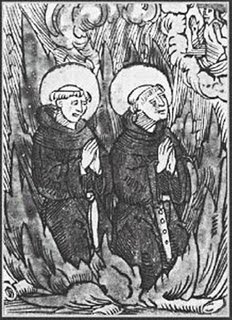The paraments really should be red today

On July 1, 1523, two young Augustinian monks- Heinrich Voes and Johann von Esch (Hendrik Vos and Johann van den Esschen in Flemish)- were burned at the stake at Brussels, Belgium. Voes and von Esch were the very first martyrs of the Reformation. They died chanting the Te Deum.
The charges against Voes and Esch were that they taught the following:
1.That no on should be deterred from reading the works of Martin Luther;
2. That worldly authorities had no power over conscience;
3. That all Christians are priests;
4. That Christ is not sacrificed again during Mass;
5. That Scripture must be the foundation doctrine and practice (sola scriptura);
6. That Baptism, Communion and Confession are the only sacraments instituted by Christ;
7. That Jesus Christ Himself works good deeds through men; that men do not contribute except for allowing Christ to use them (a wonderful capsule statement of the Lutheran understanding of sanctification!);
8. That Christ did not appoint successors to Peter as Pope, or Bishop over all churches; and
9. That if the sinner believes he has been absolved, his sins have been forgiven.
Luther's response to the martyrdom of Esch and Vohs was to write his very first hymn, Ein neues Lied wir heben an (also known as Now Shall a New Song Be Begun, and With Help of God I Fain Would Tell), which appears in The Lutheran Hymnal as Flung To the Heedless Winds (tune here). The original, as translated by F. Samuel Janzow and arranged by Carl Schalk, is below.
Sadly, material relating to the martyrdom of von Esch and Voes, including an article entitled "They Seem Like Roses to Me," seems to have been removed from the website of Concordia Seminary in Fort Wayne.
Precious to the Lord are the deaths of His saints.
HT: Scleitheim.com, ConradAskalnd.com


Comments